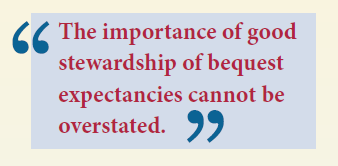In her syndicated question-and-answer column earlier this year, a reader asked Miss Manners (Judith Martin) whether the intended recipient of a large gift should be removed from the reader’s will.
The potential donor planned to leave artwork to a local museum and wrote to the museum director—twice—to let him know. The donor, who also was a regular museum supporter, never received a response. In fact, the museum director later told the donor that he did not think the notification warranted a reply.
Miss Manners’ response confirmed what the potential donor suspected: The museum simply was not interested in the gift. Miss Manners said the museum should be removed from the will “if only to spare your survivors from dealing with someone so rude.” She added that she “would also surmise that this director is not interested in any donations, if he believes he can afford to snub one of his donors who also collects art.”
How many nonprofits can say they have adequately responded to each and every notification of an intended bequest? The importance of good stewardship of bequest

expectancies cannot be overstated. This museum lost not only an estate gift, but probably a long-time supporter as well. All that was needed to retain this donor was a simple thank you.

